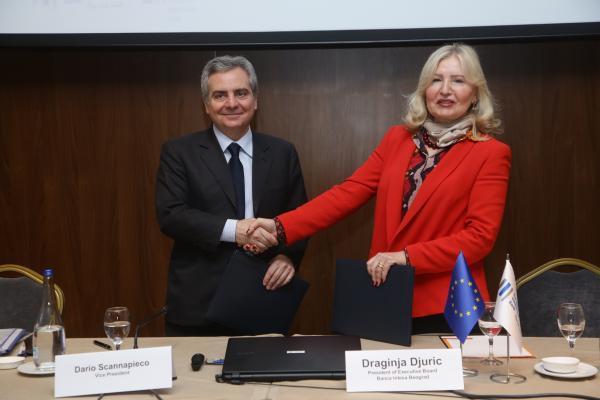
- In 2017, total disbursements stood at EUR 548m
- In 2018, four new loans and two grants have been signed in Serbia worth EUR 347m: Railway Nis-Dimitrovgrad, and credit lines to Banca Intesa Beograd, Erste Bank and Societe Generale Serbia in support of SMEs
- Strong focus on the Economic Resilience Initiative (ERI) aimed at addressing the challenges posed by the migration crisis
The European Investment Bank (EIB) is reaffirming its commitment to support the Western Balkans. In 2017, the EU bank signed financing contracts in the region amounting to EUR 330m and disbursed EUR 548m. With a total financing of EUR 7bn provided since 2007, the EIB has consolidated its role as the leading international financier in the region. New loans and grants worth EUR 347m have already been signed since the beginning of this year, aimed at facilitating the integration of the Western Balkans countries into the European Union.
In a press conference in Belgrade today at the end of a two-day official visit to Serbia, EIB Vice-President Dario Scannapieco presented last year’s results in Serbia and the Western Balkans, as well as the 2018 objectives and strategy under the Economic Resilience Initiative (ERI).
At the same event, two new loans in favour of the Serbian economy were signed: EUR 134m for Railway Nis-Dimitrovgrad and EUR 30m with Banca Intesa Beograd for on-lending to SMEs. These operations follow two other credit lines for the benefit of SMEs that have been signed with Erste Bank Serbia (EUR 60m) and Societe Generale Serbia (EUR 50m) since the beginning of this year. Furthermore, two investment grants for a total amount of EUR 73m funded by EU resources under the Western Balkans Investment Framework (WBIF, managed by the EIB) were also signed.
On top of this, in 2017, the European Investment Fund (EIF, part of the EIB Group) committed more than EUR 62.5m in guarantees and other instruments, leveraging a total investment amount of about EUR 348m.
During his visit, Mr Scannapieco met Serbian President Aleksandar Vucic and Prime Minister Ana Brnabic, as well President of the European Parliament Antonio Tajani, in Belgrade for an official mission to Serbia. The discussions are intended to further strengthen and broaden the scope of EIB Group support for the Western Balkans, with a special focus on ERI, the European initiative aimed at upgrading and developing social and economic infrastructure and stimulating growth and job creation for the Southern Neighbourhood and the Western Balkans in the context of the migration crisis.
“In the last five years, the EIB has signed contracts for more than EUR 3.7bn in the region and has disbursed almost EUR 4.7bn. An interesting pipeline of potential operations is developing in several sectors: transport, energy, environment and health. But we do not only support big projects. Enabling and ensuring investment for SMEs is a key part of our activity through loans and guarantees and equity managed by the EIF”, noted Dario Scannapieco, the EIB Vice-President responsible for the Western Balkans and the Resilience Initiative and EIF Chairman.
Railway Nis-Dimitrovgrad (EUR 134m)
The Railway Nis-Dimitrovgrad project encompasses the reconstruction, modernisation and electrification of the existing Nis-Dimitrovgrad railway line and the construction of a railway bypass around Nis, in Serbia. By facilitating rail transport, the project falls under the Connectivity Agenda of the Berlin Process. It will contribute to the competitiveness of the country's economy and will increase the quality and availability of rail services in Serbia, also contributing to the modal shift from road to rail. The EIB financing for this project is blended with EU funding under the EU-sponsored 2015 Connectivity Agenda.
Loans for SMEs (EUR 140m)
The loans to Banca Intesa Beograd, Erste Bank and Societe Generale Serbia will support the projects of small and medium-sized enterprises (SMEs) and the infrastructure schemes of local authorities. The operations will increase the availability of funding for SMEs while reducing overall financing costs. The EIB credit lines will also finance projects promoted by mid-caps and other final beneficiaries in the areas of the knowledge economy, energy, environmental protection, industry, health, education and services.

©EIB
Download original

©EIB
Download original

©EIB
Download original

©EIB
Download original

©EIB
Download original